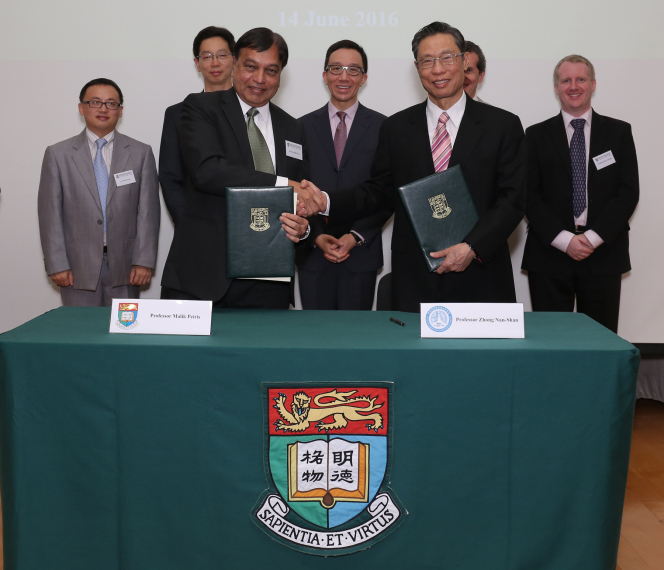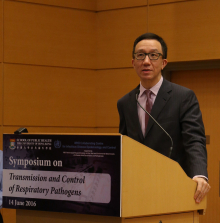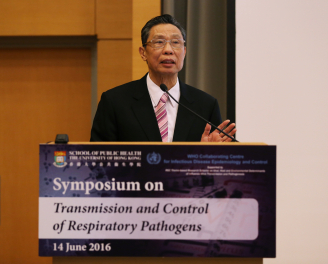Media
HKU School of Public Health hosts a Symposium on
“Transmission and Control of Respiratory Pathogens”
14 Jun 2016

Professor Malik Peiris (Left on the first row), Tam Wah-Ching Professor in Medical Science, Chair Professor of Virology and Director of School of Public Health, Li Ka Shing Faculty of Medicine, HKU and Professor Zhong Nan-shan (Right on the first row), Director of State Key Laboratory of Respiratory Disease signed a Memorandum of Understanding to facilitate research collaboration between the two institutions.
The WHO Collaborating Centre for Infectious Disease Epidemiology and Control at the School of Public Health, Li Ka Shing Faculty of Medicine of The University of Hong Kong (HKU) hosted a symposium on Transmission and Control of Respiratory Pathogens today (June 14). The symposium was supported by the Hong Kong Research Grants Council’s Theme-based Research Scheme on Viral, Host and Environmental Determinants of Influenza Virus Transmission and Pathogenesis. The symposium featured Professor Zhong Nan-shan, HKU Centennial Distinguished Chinese Scholar and Director of State Key Laboratory of Respiratory Disease, as the keynote speaker. Infectious disease scholars from renowned institutions around the world also presented at the symposium, which was attended by over 200 healthcare policy leaders, clinical practitioners, scientists, academics and public.
To facilitate research collaboration between the State Key Laboratory of Respiratory Disease and the School of Public Health, a Memorandum of Understanding Signing Ceremony was held at the symposium. “The team of virologists and epidemiologists of our School have been collaborating with colleagues of The State Key Laboratory of Respiratory Disease on fighting outbreak battles over the years. This signing of the collaborative agreement will further strengthen the scientific partnership and academic exchange between the two institutions so that scholars from both sides of the border can synergise and contribute to the advancement of infectious disease research,” said Professor Gabriel M Leung, Dean of Li Ka Shing Faculty of Medicine of HKU and Co-Director of WHO Collaborating Centre for Infectious Disease Epidemiology and Control in his welcome address.
Professor Zhong Nan-shan gave the keynote address on The role of infection control in emerging infections. “The consequence of failure in infection prevention and control is apparent in the MERS outbreak in Korea in 2015 and the spread of Ebola in 2014,” said Professor Zhong. He believes that effective and sustainable infection prevention and control measures are crucial in protecting both health care workers and the community in our battle against viral diseases. “Participation, one element of the four ‘P’s of the modern medical model, is also essential for the government, medical professionals, as well as citizens in combating emerging infectious diseases,” remarked Professor Zhong.
Leading experts in the field including Professor David Hui of The Chinese University of Hong Kong, Dr Werner Bischoff of Wake Forest University, and Dr Samira Mubareka of The University of Toronto, along with speakers from School of Public Health, Li Ka Shing Faculty of Medicine, HKU including Professor Ben Cowling, Dr Joseph Wu and Dr Hui-ling Yen also shared their research findings on this important topic for global public health.
“In zoonotic infections which have not yet acquired efficient transmissibility between humans, control at source needs to be implemented,” said Professor Malik Peiris, Tam Wah-Ching Professor in Medical Science, Chair Professor of Virology, Director of School of Public Health and Project Coordinator of the Theme-based Research programme, in his closing remarks. “Unpredictable zoonotic outbreaks and pandemics pose major impact on human and animal health. The recent temporary suspension of live poultry trade by the HKSAR government due to the detection of H7N9 bird flu in a bird feces sample collected in Hong Kong was a prudent public health measure to prevent and control the spread of deadly viral diseases,” said Professor Peiris.
RGC Theme-based Research Scheme on Viral, Host and Environmental Determinants of Influenza Virus Transmission and Pathogenesis (2014-2019)
Awarded by the Hong Kong Research Grants Council, this five-year programme is an interdisciplinary collaborative project in influenza virus transmission and pathogenesis involving The University of Hong Kong, The Chinese University of Hong Kong and The Hong Kong University of Science and Technology. It aims to enhance global public health, provide high quality research, intellectual capacity, real-time data to inform local, national and global health policy, train the next generation of scientists and help maintain and enhance Hong Kong’s world-leading status in influenza research.
About the WHO Collaborating Centre for Infectious Disease Epidemiology and Control at the School of Public Health, Li Ka Shing Faculty of Medicine, HKU
The School of Public Health, Li Ka Shing Faculty of Medicine of HKU has been designated as a WHO Collaborating Centre for Infectious Disease Epidemiology and Control with effect from 10 December 2014. The designation of the School of Public Health, Li Ka Shing Faculty of Medicine of HKU (HKU SPH) as a WHO CC is the first of such kind at the University. HKU SPH has a long and distinguished history in public health education and high impact research. With world leading research in infectious diseases as well as on non-communicable diseases of both local and global importance, HKU SPH has made significant contributions through its research and advocacy to improve the health of populations and individuals, both locally and globally. HKU SPH is a leading research and teaching hub in public health on influenza and other emerging viruses, control of infectious and non-communicable diseases, tobacco control, air pollution, psycho-oncology, behavioral sciences, life-course epidemiology, and health economics, health services planning and management. Its work has informed international (e.g. the World Health Organisation, Food and Agriculture Organisation of the United Nations), national and local public health policies.
Please visit the website at http://www.med.hku.hk/v1/news-and-events/press-releases for press photos.
Professor Gabriel Leung, Dean of Li Ka Shing Faculty of Medicine of HKU and Co-Director of WHO Collaborating Centre for Infectious Disease Epidemiology and Control pointed out that the Memorandum of Understanding will further strengthen the scientific partnership and academic exchange between the two institutions, and scholars can contribute to the advancement of infectious disease research.


